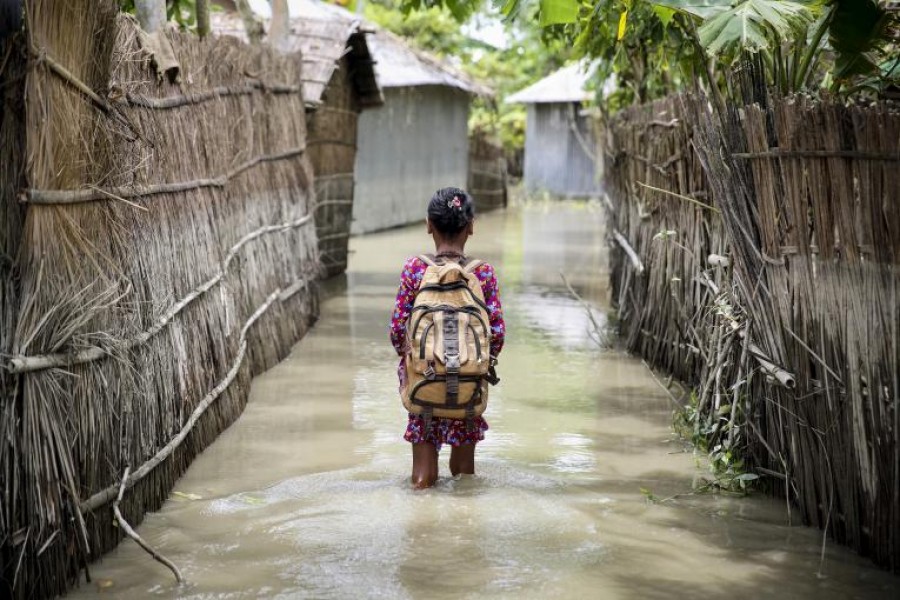Across developing Asian, Covid-19 is a gigantic nemesis that can paralyse their already frail and inadequately prepared health system. Overcrowded health facilities combined with shortage of personal protective equipment (PPE) for health workers put immense pressure on the health systems. Unsurprisingly, other services might have to wait, such as pregnancy care check-up, or immunisation services for children.
Fortunately, some countries keep essential health services for children remain available. India's Ministry of Health and Family Welfare postponed the Village Health Sanitation and Nutrition Day (VHSND) but immunisation are available at facility level. Indonesian Pediatric Society or IDAI recommends parents to continue immunisation for their children, and health services should offer these services with appropriate infection control, as it is critical for their health and survival.
Where are the children in this Covid-19 situation?
It severely affects mainly the elderly, the chronically ill, whereas young people and children usually have mild symptoms or are asymptomatic. However, they might progress into more severe situation such as pneumonia.
If children and their families do not have access to general public healthcare, this will increase risk for other preventable diseases and/or malnutrition.
On top of health impacts, quarantine also affects children and their families. To date, 195 countries have partial or full closure of schools, a move which reduces their capacity to learn, and increases risk of child abuse and other protection issues.
By studying previous disease outbreaks, we learn that children's lives might be threatened by Covid-19 even more. World Vision's report, 'COVID-19 Aftershocks' warns that secondary impacts of the pandemic could threaten the lives of up to 30 million children. A combination of pre-existing weak health systems, populations with high need, and Covid-19 may lead to catastrophic mortality for children.
With closure of businesses, everyone's livelihood is impacted, but the poorest and vulnerable children will suffer the most. Even before Covid-19, they lack social protection, rights at work and decent working conditions. Now, their lives are just getting worse.
Caregivers who experience increased stress and lacking resources will not be able to care for and protect their children. What will happen to those children, whose caregivers succumb to the virus, or whose families' livelihoods are disrupted? Governments and the communities need to find ways to support these families to meet their basic needs and ensure mental health and psycho social support (MHPSS) services available for them.
Along with the medical teams, the frontline community health workers (CHWs) or community health volunteers play crucial role for Covid-19 response. They are mobilsed into the community, often without protective equipment, to provide important information about symptoms of Covid-19 and teaching people about hand-washing with soap. The CHW's regular work in maternal child health and nutrition programmes, such as growth monitoring and promotion, home visitation and counselling of mothers and infants, has to stop until government and NGOs find ways to continue these services while ensuring everyone's safety.
Covid-19 is a new threat, but for years, people in Asia have been living together with other dangerous diseases, such as Tuberculosis, Malaria, HIV, Dengue Fever, and Rabies. CHWs and volunteers have long experience in doing communicable-disease prevention. Still, Covid-19 is the "game changer" - forcing governments, NGOs and CSOs (civil society organisations) to find new ways of working to ensure continuation of health and nutrition programme even during an outbreak. Some fundamental questions trigger the need for creativity:
* How to do behaviour change programme when everyone has to stay home?
* How to use technology to assist the work of CHWs and volunteers?
* How to provide mental health and psychosocial support (MHPSS) to caregivers and children impacted by Covid-19?
While seeking solutions in collaboration with governments, UN agencies, NGOs and partners in the countries hit by Covid-19, including Bangladesh, we are calling for finding ways of expanding access of essential health services, especially for children, the most vulnerable and those at risk. Community health workers and volunteers equipped with Covid-19-specific response training and wearing appropriate protective gear are crucial for this work. Civil societies, private sector, academia and research institutions need to collaborate with governments in scaling-up digital platforms for disease surveillance, while diagnosis and case monitoring are affordable and available in remote locations.
Any response to a pandemic such as Covid-19 should be as integrated as possible, putting children at the centre and covering the sector of health, nutrition, psychosocial, child protection, education, and livelihood. It is not just the role of governments to think of the poor; it is everyone's responsibility. Children will be the future of each country, so governments and communities need to develop strategies and policies to protect and enable children to grow in a safe and supported environment.
Esther Indriani is a public health specialist, working as Technical Advisor for Health and Nutrition, at World Vision International.


